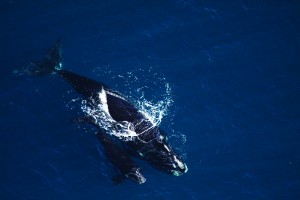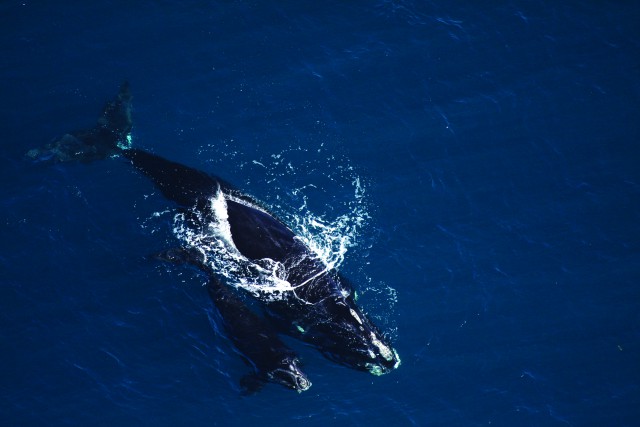Eight North Atlantic right whales have died in Canadian waters since early June

A fourth entangled North Atlantic right whale has been spotted near Magdalen Islands, the Department of Fisheries and Oceans tweeted late Tuesday.
“We and our partners are currently evaluating different response options,” it reads.
?? A fourth entangled #RightWhale has been spotted today by our aerial surveillance crew 90 km off the coast of the Magdalen Islands. We and our partners are currently evaluating different response options. pic.twitter.com/p7YhYGYaX3
— Fisheries and Oceans (@FishOceansCAN) August 7, 2019
With eight North Atlantic right whales already dying in Canadian waters since early June, the situation for the endangered species grows increasingly dire.
But a new whale rescue team, based closer to the Gulf of Saint Lawrence, is being trained to more quickly respond when a distressed whale is spotted.
“Right now, the only two disentanglement teams that are equipped and experienced enough to tackle a right whale entanglement, one is based here on Campobello Island, that’s us,” said Moira Brown, a research scientist with the Canadian Whale Institute. She’s also a member of the Campobello Whale Rescue Team.
“And the other is Tangly Whale [Whale Release and Strandings Group] in Newfoundland.”
The Campobello Whale Rescue Team has responded to the whale deaths in the Gulf this summer, but Brown said that isn’t ideal.
With the two capable whale teams being so spread apart, it has revealed a gap in what services can be provided, she said.
Partnered with FRAPP
As a result, Brown said her team is working with Fédération régionale acadienne des pêcheurs professionnels (FRAPP), to train a team of local crab fishermen, based near Shippagan, to be able to handle an entangled whale near the Gulf.
She said her organization presented to the federation in February. Three fishermen were then available to go to Campobello Island in March for on-water training.
“We are aware that’s not enough, we need to have some more” said Jean Lanteigne, general director of FRAPP. “We’ll be working with our group to ensure we have sufficient numbers.”
The idea of having firefighters become involved is also being explored, Lanteigne said.
“It became obvious to everyone that this area needs to be addressed,” said Sean Brillant, senior conservation biologist at the Canadian Wildlife Federation. Brillant also works for the Canadian Marine Animal Response Alliance to facilitate cooperation among several rescue teams.
“Many of the fishers in the area identified this as well and demonstrated a willingness to be trained,” he said.
It’s estimated it will take three to five years for a new team to become operational, with experience and safety being priorities. The death of New Brunswick whale rescuer Joe Howlett made national headlines in 2017 after he was struck by the tail of the animal he was trying to save.
Restrictions in place
New research — led by our colleague in ocean protection, Dr. Kimberly Davies from UNB Saint John — suggests a major food source for the animal, the Calanus finmarchicus, was disrupted due to the changing climate. This possibly led the species to seek food elsewhere and into shipping lanes and fishing nets near the North Shore.
Fisheries and Oceans has implemented restrictions on fishing and the speeds of ships in the area as a response.
“Fishermen are required to relocate their gear when a right whale is spotted,” Brown said.
“This is a very dynamic program.”
New methods of fishing involving modified gear, like ropeless traps and other engineered solutions are also being studied.
Right now, the equipment used in training is being provided by the Campobello team, Lanteigne said. But talks are underway with the Department of Fisheries and Oceans to secure gear for the Shippagan team.
“This habitat shift has resulted in these animals changing their habitat preferences in the spring, summer and fall,” said Brown.
“[The fishermen are] being faced with a problem they haven’t face prior to that.”
Recommended Links:
Canada is once again a world leader in fisheries management and protection
Dead North Atlantic right whale spotted in Gulf of St. Lawrence
Second North Atlantic right whale found dead


